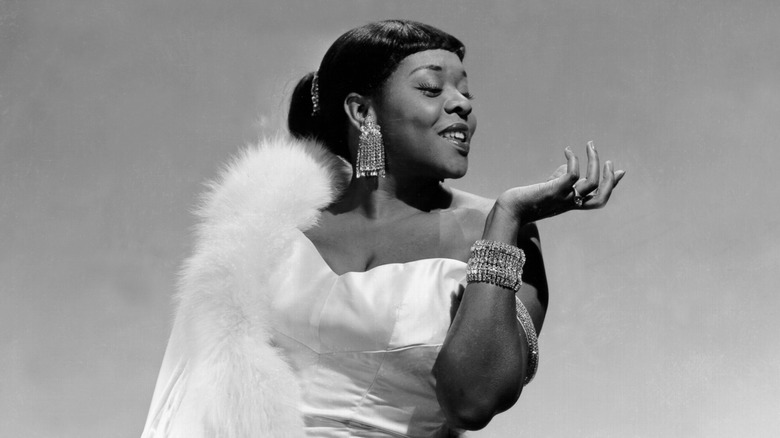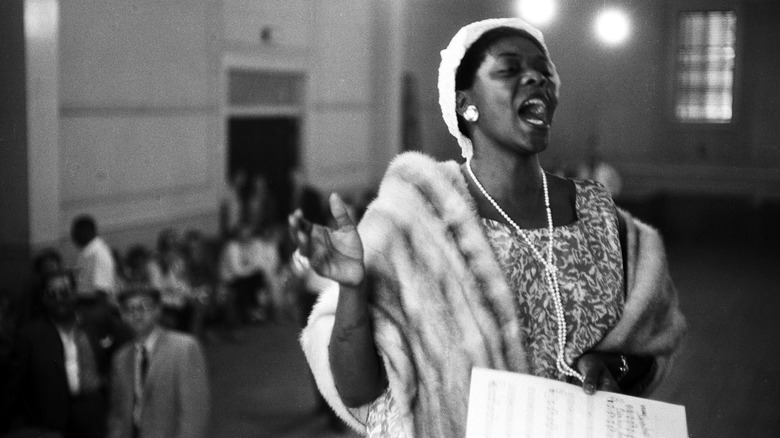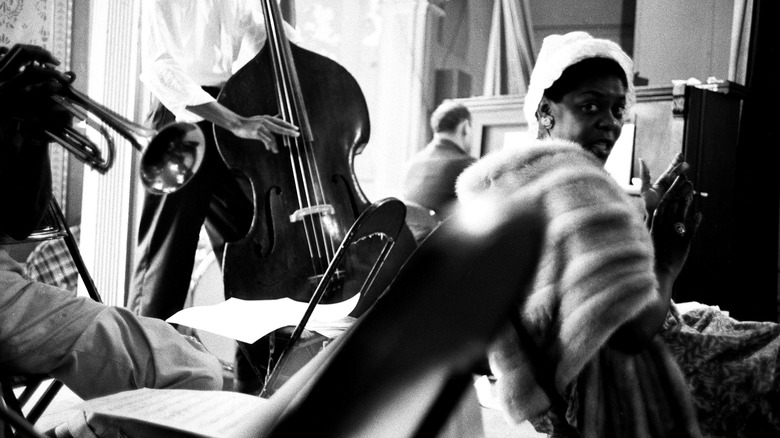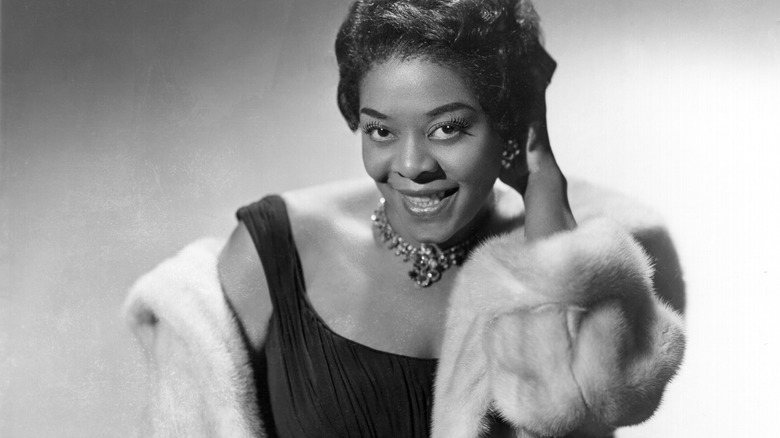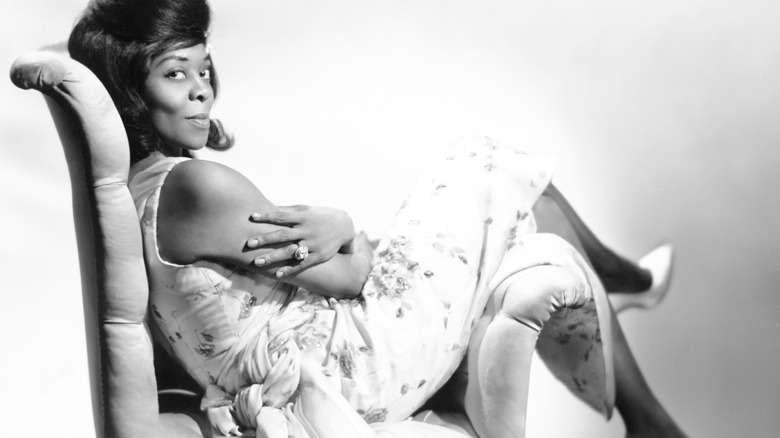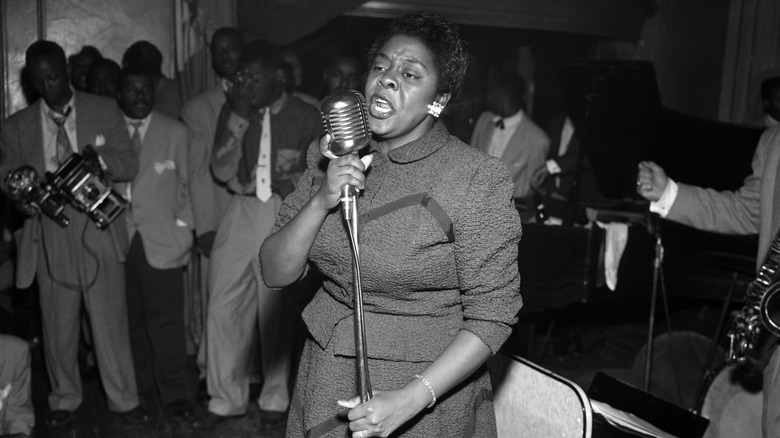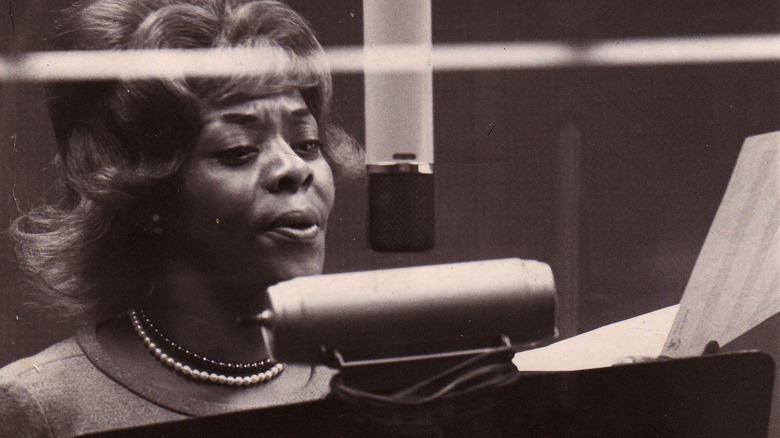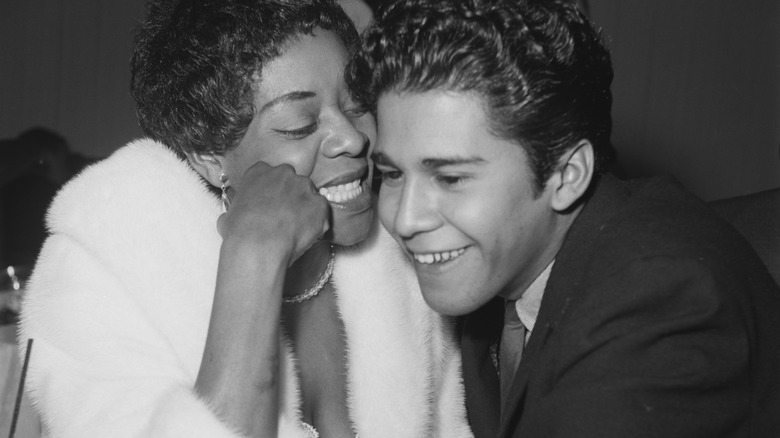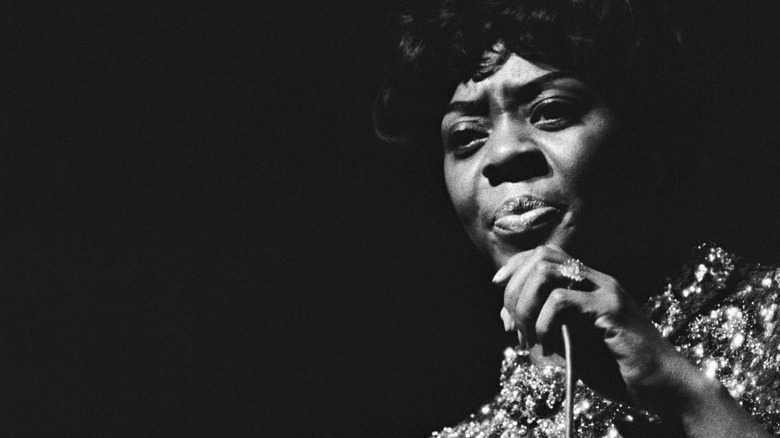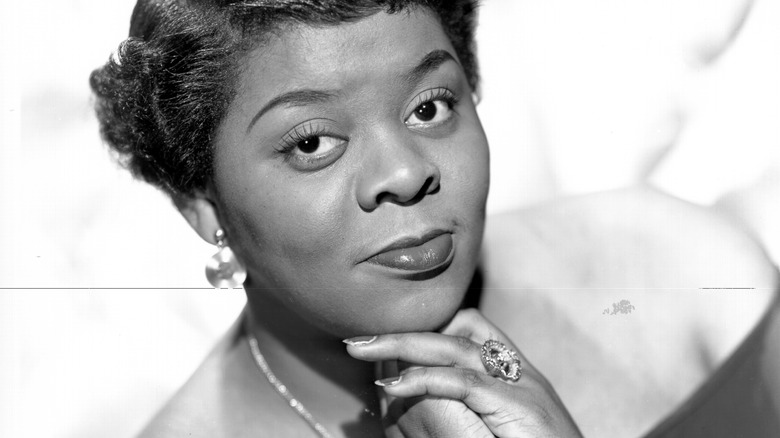The Tragic Real-Life Story Of Dinah Washington
There's something to be said for the music that existed before auto-tune and other kinds of voice-changing studio magic. Listen to tracks from the 1930s, 40s, and 50s, and it's a guarantee that the voice on the record is legit. There's a handful of singers that are guaranteed to bring the goosebumps: They're the ones that have the voice that just seems like it comes from a place other than Earth, and Dinah Washington is on the top of that list. Hers is a voice that comes right from the soul, and hits listeners right in their own. It's beautiful, timeless, and out of a different era long-gone.
That said, there's precious little that's known about her. Compare her to artists who have had encyclopedia-size books written about them, and she's as enigmatic as she is incredible. Mercury Records director Clive Otis — who produced Washington's classic "What a Difference a Day Makes" — told The Independent that the power in her voice came from an incredibly difficult life — and he also confirmed that it was one that she rarely spoke of.
It was fellow singer — and her god-daughter — Patti Austin who gave perhaps the deepest insight into her character, saying, "I remember a reporter saying that she was the kindest person he had worked with, and she screamed at him and told him to write about Dinah the b****. It wasn't easy being Black, female, and famous, and she covered herself." That said, what has been written about her struggles pre-fame and post-fame? Let's start by saying this: She always carried a gun.
Her feelings of loneliness began in her earliest memories
Dinah Washington — born Ruth Jones — might have been an Alabama native, but she was Chicago-raised. According to what James Haskins wrote in his biography, "Queen of the Blues: A Biography of Dinah Washington," her family's decision to head north not only shaped her childhood, but had a lasting impact on her. It's not clear how old she was when they moved, but Haskins suggests the move coincided with the development of her earliest memories. She understood what it was to be different before understanding what it meant to belong: She was around three or four at the time that they moved, and unfortunately, those early memories were ones of loneliness and otherness.
For starters, her father was largely absent. The Great Depression had left families with few options, and Ollie Jones's most reliable occupation was that of a gambler. Even as he disappeared for long periods of time, it fell to her mother, Alice, to support her, her brother, and her step-siblings. That meant she was often at work, leaving young Ruth to navigate an often hostile northern city by herself.
And it wasn't easy: Haskins says they not only faced extreme prejudice because they had moved up from the deep south, but he said that she was set apart by more than her southern accent. It's no secret that kids are cruel, and when she developed bad skin as a child, she was ostracized and given the nickname "Alligator." He wrote, "There was little about herself of which she could be proud."
She grew up in shocking poverty
One of the main sources of information on Dinah Washington's personal life is her longtime friend LaRue Manns. Interviewed for James Haskins' biography "Queen of the Blues: A Biography of Dinah Washington," she said that the family's life and her childhood growing up on the South Side of Chicago was incredibly dismal. "They were living in the projects, and there were rats and roaches and they didn't have enough food or enough clothes to wear," she explained. Not only was it in the middle of the Great Depression, but uprooting the family from Alabama and moving north meant they were on the outskirts, newcomers without the long-standing community ties they'd left behind.
Manns shared one particular story that illustrates just how dire things were. "She and her mother had to share one pair of stockings. She had to wash out her mother's pair of stockings to wear if she was going someplace, you know, and her mother wasn't going." Once she had started school, she had become even more acutely aware of just how little they had, and it had a lasting impact on her.
After Ruth Jones became Dinah Washington and Washington became a star, one of the things she always insisted on was buying many, many pairs of stockings. It was just one part of her legendary spending, and it was something so small yet specific that Manns recalled asking her about it. Washington explained: "I want plenty of stockings. I don't ever want to have to wear somebody else's stockings."
Her relationship with her mother was difficult and often misunderstood
Way back in 1999, the theater production "Dinah Was" hit stages in Chicago. It was an opportunity to get an inside look at Washington's life, but like many stories that are translated from real life into performance, some things weren't entirely accurate — and that was according to what Washington's sisters, Clarissa Smith and Estrellita Dukes, told the Chicago Reader.
Chief among those misunderstood, exaggerated things was the relationship between Washington and her mother, Alice. Her sisters — who pointed out that when Washington hit it big, one of the major purchases she made was a house for her mother — clarified that although they didn't see eye to eye on many things, it wasn't a matter of outright conflict. Dukes explained, "It's true we were a religious family and my mother never really reconciled herself to the fact that Ruth stopped singing in the churches. My mother didn't approve of Ruth's lifestyle — the drinking, swearing, husbands. ... But just because you don't get along with someone, doesn't mean you don't love them."
The James Haskins biography of Dinah Washington, "Queen of the Blues," suggests that from the time Washington was little, the relationship was a difficult one. Alice Jones wasn't just incredibly religious, but she was incredibly judgemental as well. Near-constant criticism left Washington believing that she could do no right, and wondering if her mother even loved her. Still, Washington always made sure that she provided for her family: When she passed away right before Christmas, her sisters found their gifts carefully wrapped and ready for the holidays.
She was never comfortable in her own skin
Being judged on appearances isn't something that only happens to those on stage and on the screen, but for Dinah Washington, the criticism she was constantly subjected to had devastating consequences. It had started when she was ridiculed for her skin color and condition as a child, and continued when she started performing. She was regularly told that she didn't conform to the standard of feminine beauty of the day, and according to James Haskins' biography, "Queen of the Blues," she was — at best — ignored even by the guys in her band.
Longtime friend LaRue Manns said that she had always dreamed of being something else, and it was only made worse when magazines ran stories like the one that described her as "plump, good-natured Dinah." It led to a vicious cycle of not only dieting, but prescription pills and self-administered injections of mercury. Manns said that at one point, she was injecting herself with so much of the stuff that she would drop several dress sizes in a matter of hours. Along with that came side effects like insomnia and massive mood swings. Was it healthy? Absolutely not.
Those interviewed by Haskins couldn't agree on just what kind of impact Washington's fluctuating weight and insecurities had on her, but they do say that the more she traveled and toured, the heavier she got. Why? Because segregation was in full swing, and there were plenty of cities where there just wasn't the option for them to sit down at a good restaurant serving good food, simply because she was Black.
Life on the chitlin' circuit wasn't easy
Even when Dinah Washington started to be noticed for her voice, life was far from easy. Making ends meet meant keeping to a grueling schedule: She was putting so many miles on vehicles that it was necessary to buy new cars every year. According to the James Haskins biography, "Queen of the Blues," Washington and her band would average at least 100,000 miles a year, be on the road for months at a time, and most of their nightly gigs? They were one-night shows, leaving them to crisscross the country while still having to perform each and every night.
Most of their shows were at venues on the chitlin' circuit, a series of theaters, nightclubs, and even churches where Black performers were allowed to go at a time when segregation was still the norm. And it's left behind a complicated legacy: On one hand, it was a series of venues that gave Black performers the chance to get noticed and make it big, but on the other hand, it wasn't easy.
Entertainers were often unpaid, and sometimes they were paid simply in food. Groups might be expected to play multiple shows a day, before packing up and driving to the next venue to do it all over again ... sometimes while sleeping in cars and being harassed by law enforcement along the way. When James Brown was on the chitlin' circuit, he spent 51 weeks a year on the road, and once did 37 full shows in the span of 11 days. In other words, it's not for the faint of heart.
Alcohol, overwork, and depression were a constant cycle
It was Patti Austin who described Dinah Washington as having "a heart like the Grand Canyon," and added that once she started making money, she'd help anyone in need. With that giving, however, came debt, and that debt got deeper and deeper: In his biography "Queen of the Blues," James Haskins explains that not only was she giving to her friends, but she was supporting her family and paying a troupe of musicians. Add in clothes, jewelry, hairdressers, and other staff — along with her insistence on helping out anyone who had a family emergency or other similar, sudden need for cash — and it added up.
At one point, she was diagnosed with a strained larynx and told that she needed to take at least three weeks to allow her throat to heal. She couldn't afford to, though, and never truly recovered from the incident. Alcohol — cognac, in particular — became a constant companion, and so did depression.
Those who were closest to her never really knew the extent of her mental health struggles. LaRue Manns said that several times, she found suicide notes that she had left, but was never certain what, exactly, was going on with her. No one quite knew what to do: She became notorious for firing those closest to her, then acting like nothing had happened just minutes later, and it left those around her to wonder if something was truly wrong, or if she was simply acting.
If you or someone you know needs help with mental health, please contact the Crisis Text Line by texting HOME to 741741, call the National Alliance on Mental Illness helpline at 1-800-950-NAMI (6264), or visit the National Institute of Mental Health website.
Her search for happiness led to many marriages
No one's entirely sure just how many times Dinah Washington was married, but the general consensus is that it was somewhere between seven and nine times. (She's pictured here with husband number six.) The first was a three-month-long marriage that happened when she was 17, and it's a perfect example of how little is known about her. While some accounts say John Young was 23 at the time of the wedding, Washington's longtime friend LaRue Manns says (via "Queen of the Blues") that he was at least in his 30s, and perhaps in his 40s. Washington would later say that she married him for the same reason many other women of the era chose to marry someone they weren't necessarily in love with: "Seizing the opportunity to get away from home, ... I married him."
By 1957, she had ended marriage number four and — in a rare and candid interview with The Pittsburgh Courier — explained that the reason for the failed marriages was pretty straightforward: She wanted love, security, and a family, and those she married hadn't been willing or able to give her what she was looking for.
According to Patti Austin, Washington took incredible pleasure in luring men away from their wives, helping to speed up divorces, then proposing to them. "She also had a big ego. ... She also loved to marry somebody else's husband. She bought a lot of divorces and paid for more child support than anybody can think of. It was a great challenge to take somebody else's man."
One divorce came after a heartbreaking, accidentally overheard conversation
When Dinah Washington spoke with The Pittsburgh Courier about her marriages and divorces, she acknowledged the fact that her fourth — to a man named Walter Buchanan — had lasted just eight weeks. She said that he had sued her for alimony, but she left out the most heartbreaking part.
Buchanan was a bass player, and after they married, she promoted him to the bandleader of what was now called "Walter Buchanan's Orchestra." It was a first and a last, and according to what James Haskins wrote in "Queen of the Blues," it was likely that Buchanan saw her simply as a means to an end. Washington, it turned out, found that out the hard way.
Washington broke things off with Buchanan when they were in the middle of a tour, and she said that she had first started to have a very, very bad feeling about her relatively new husband when he started joking about how he needed a new car. Buchanan was at his father's house when Washington called him: "I was about to hand up my phone when,by the sound coming through, I realized his phone was off the hook. There was a loud laugh, and I heard someone say, 'You better stay with this woman and get all the money you can.' That was enough for me. Bursting with anger, I ... told him I wanted a divorce." Buchanan didn't get his alimony after she brought up the overheard conversation in court.
When she died in 1963, she was just 39 years old
When Dinah Washington died in 1963, the news story was rather shockingly buried on page 79 of the 350-page issue of The New York Times. Early reports said that she had spent the evening watching TV with her husband, Detroit Lions halfback Dick Lane. They were planning a big family Christmas, and it was Lane who discovered Washington's unconscious body when the sound of the television woke him up. A nearby pill bottle prompted suspicions and an autopsy, and that autopsy would find that the cause of her death was an overdose of alcohol and diet pills.
Longtime friend LaRue Manns has talked about that initial shock, saying (via "Queen of the Blues") that neither she nor Washington's mother believed the news at first: Her mother said that she was just going to continue fixing breakfast, she was so sure that Washington would walk through the door at any moment.
Manns said, though, "As the day went on, it finally began to hit me. I kept thinking that if I'd been out there ... I had just had the doctor send out a new order of pills and they had just arrived." Manns said that there weren't many pills missing from the bottle, confirming to her that it had been an accident. Somewhere around 30,000 people turned up to pay their respects at her funeral, standing in the below-freezing temperatures of that dismal Chicago winter to bid farewell to the 39-year-old singer with the voice of the ages.
